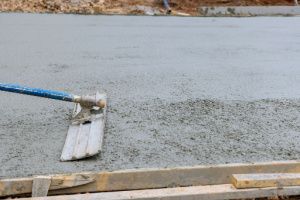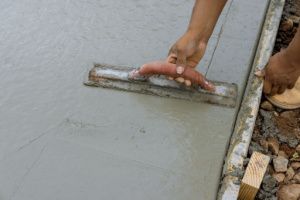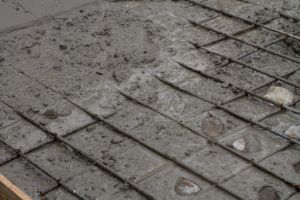Concrete is considered an ideal driveway material thanks to its ability to last for several decades and its maintenance-free nature. Standing around the middle of the pack of driveway materials in terms of price, it represents good value for money.
Some homeowners might consider pouring their own DIY concrete driveway to keep costs down. Although some aspects of concrete work might not seem daunting to experienced DIYers, pouring a driveway is a major project that requires true experience and skill. There is a lot at stake, from the driveway’ structural integrity and safety to its appearance. Getting the final finishing step wrong can mean being stuck with an unattractive driveway for several decades.
Here are 8 reasons that pouring your own concrete driveway should be avoided.
Forming Problems

Forming is one of the biggest determinants of whether a cement project will be successful. The forms that hold concrete while it is wet must be placed perfectly accurately and should be double-checked prior to pouring concrete.
However, it is not just the placement that is important; the forms must also be strong enough to stand up to the job. Otherwise, the form could blow out while the concrete is being poured, causing concrete to spread to areas where it is not wanted, which can be a very difficult problem to correct.
Pouring the Driveway Too Thin
One common mistake that people make when trying to pour their own concrete driveway is pouring the concrete too thin. Although concrete is known for being very strong and long-lasting, it will only have these attributes if it is poured in an appropriate thickness. Concrete should never be poured any thinner than four inches for any type of application. However, if heavier vehicles will be using the driveway, a thickness of at least 6 inches is recommended.
Using Cement That Is Too Old
People who are not familiar with concrete are not always able to recognize when they are working with old cement. The active ingredient in concrete, Portland cement, is perishable. Some homeowners may use concrete mix that they have been storing in their garage since their last concrete project, but it is important to avoid using any type of just-add-water concrete mix or cement that is more than a year old. Even newer cement that has hard lumps should not be used for concrete as this indicates the cement was exposed to moisture at some point during its storage and has lost its ability to harden.
Troweling at the Wrong Time

Concrete is traditionally smoothed with a trowel to give it the desired surface texture, and this needs to be carried out at the right moment prior to hardening for the best results. Concrete should ideally be finished once the surface water has dried but while the concrete is still soft enough to be workable.
When it is troweled too early, more surface water will form and that can create a surface that will eventually flake and fail. On the other hand, troweling too late means it will no longer be soft enough to create a smooth surface. It is difficult to know the precise amount of time to wait as this will depend on the air temperature as well as how wet the concrete was when it was poured. This is a determination that is best left to the experts.
Pouring a DIY Concrete Driveway at the Wrong Air Temperature
It is important to avoid pouring concrete when it is hot and humid outside. At temperatures above 80 degrees, pouring concrete is risky because it can start hardening before you can pour and trowel it. However, temperatures that are too cold can also be problematic as pouring concrete during a danger of frost could cause it to lose a significant amount of strength should it freeze prior to curing. It is best to pour concrete in moderate temperatures to avoid encountering these problems.
Working With Concrete That Is Too Wet
One of the easiest mistakes for inexperienced DIYers to make is working with concrete that is too wet. When concrete is mixed properly, it looks like it will be too dry to flow and trowel, so many people mistakenly add more water to the mix. One way to determine the correct mixture is by checking if it can be formed into a pile that is 4 inches tall and 4 inches round, but it is best to have an expert mix the concrete to ensure it will be strong and durable.
Damaging Your Skin
The high alkalinity of the cement used in concrete can cause injury to your skin. Unfortunately, you might not notice this until it is too late. You may be working with wet concrete on your hands without an issue, but red and painful areas of cracked or dissolved skin will not show up until later. When hardened concrete is left untreated on skin, it can lead to blistering, swelling and even burns that can result in permanent scarring. That is why it is essential to wear gloves and only handle wet concrete using a shovel or trowel.
Using the Wrong Reinforcing Rods

Although concrete may be strong when compressed, it can be weak when forces attempt to pull it apart. This is why concrete is typically reinforced using rods. However, many of the reinforcing rods available for concrete are made out of bare steel, which is prone to rusting when exposed to any water that makes its way into the concrete. Once it rusts, it can expand. This may cause the concrete to break apart under internal pressure. Therefore, it is imperative to select corrosion-proof reinforcing rods to ensure the long-term reliability of the driveway. Driveway contractors have the experience needed to select the right materials for this purpose.
Contact the Experienced Northern Virginia Driveway Contractors
A DIY concrete driveway project that goes wrong can be expensive to correct. Ensure your driveway is strong and safe by trusting the job to the experienced Northern Virginia driveway contractors at Dirt Connections. Contact us today to discuss your project or request an estimate.
Summary

Dirt Connections was started with one goal in mind: providing quality residential and commercial construction services to clients on time and on budget. Reach out for more information on how we can support your next project.
For your convenience our estimates are free and by appointment. Call 703-940-9949 for a free estimate today!










































